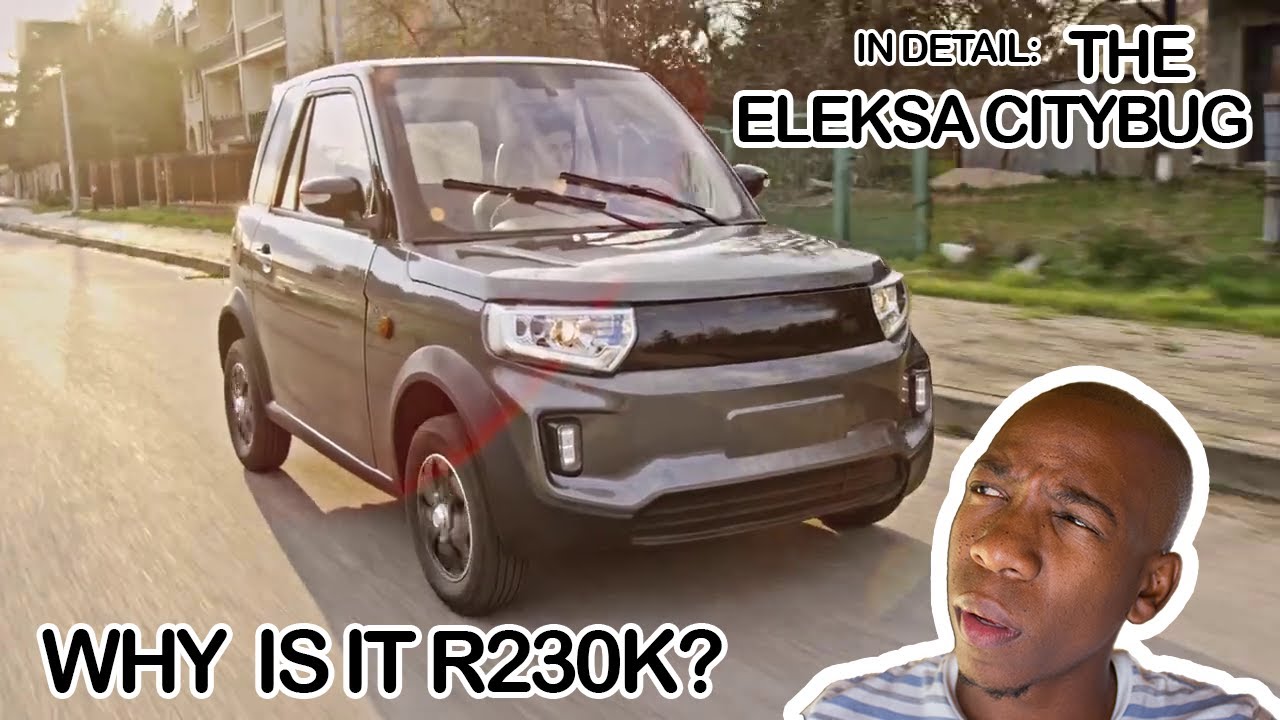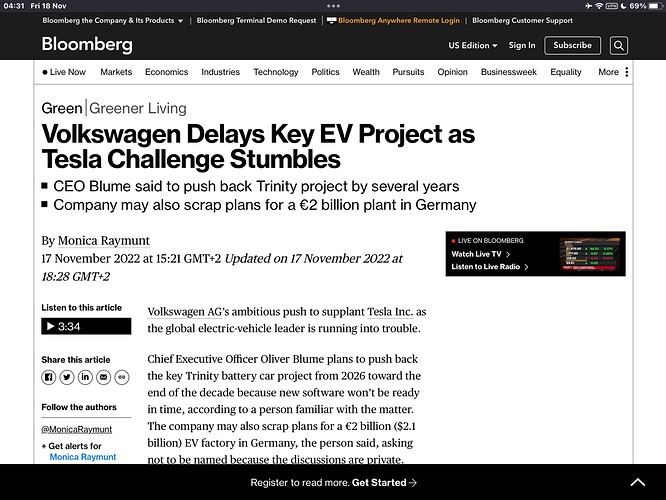It will be a much more even picture if the fuel storage of both systems are also part of the picture. Electric batteries are large and heavy.
Agree… BUT… I think if you added all the ICE bits on a scale and then ALL the EV bits that would be the interesting comparison.
That engine must offset some battery weight and the extra structural additions needed for ICE, while the EV battery is structural in its own right (Tesla for eg).
Things could get very interesting fast ![]()
Aggreed. The EV is also less complex. That should mean less issues and maintenance as well.
I am a bit biased towards EV as much more about electrics and much less about ICE engines (I know where the dipstick is and the windscreen water filler ![]() ).
).
I know a little bit about both, enough to service my cars and diagnose the odd problem (eg, diagnosing a failed coilpack with an ODB2 reader, or an evap issue because the “trims” are too far out)…
People who complain about battery replacement costs have never replaced the catalytic converters and lambda sensors on a BMW M3. It has two converters (one for each bank) and 4 sensors (before and after the cat). Oh, and replacement must be done at the dealer… no aftermarket shenanigans until there are aftermarket options for BEVs too.
So, last year Dept of Trade & Industry changed the rules for aftermarket / OEM / off-brand car parts.
In essence your dealer can no longer refuse your warranty because you serviced elsewhere, used OEM parts, installed aftermarket components, and so on. If they want to refuse, they have to prove a non-official part actually caused the specific damage claimed under warranty. And if that is the case, the consumer has recourse to the actual service station for supplying substandard parts.
So it’s a bit complicated, and not enough lawsuits yet to set any real precedents, but it’s in the right direction. And EVs will be introduced where this is already regulation, so should be interesting at the very least.
Edit: They also cannot force a new car to be sold with an included service plan, allowing the customer to shop around for a better deal on the “included” service plan. Think this one had a lead time before implementation, but not 100%.
GreenCape revealed in its 2022 Electric Vehicles Market Intelligence report that 74% of those who responded to its EV price survey were only willing to pay between R200,000 and R500,000 for an electric car.
This presents a challenge as pricing for almost all EVs are above R500,000 – except for one.
Surprisingly, the cheapest EV car on this list is not as expensive as one might think. The Eleksa CityBug retails for R230,000 and costs around R15 to fully charge, said the company.
However, the CityBug is only powered by a 9kWh battery, and 4kW electric motor mounted to the rear axle, producing a blistering speed of up to 55km/h.
As a result, some South African CityBug owners still rely on a petrol- or diesel-powered car when travelling long distances that involve a fair bit of highway travel, reported TopAuto.
Groetnis
The lack of government policy on electric vehicles (EVs) in South Africa, combined with challenging local conditions, makes it difficult for manufacturers in the country to secure international investment.
This is according to National Association of Automobile Manufacturers of South Africa (Naamsa) president Neale Hill, who said it is “extremely difficult” to sell South Africa as an investment destination.
Local auto manufacturers face a 2030 deadline, after which the exportation of internal combustion engine (ICE) vehicles to European markets will be banned.
However, the country’s rolling blackouts, debilitated rail and port services, and lack of clarity regarding state incentives hamstring vehicle manufacturers in South Africa.
Hill told the Sunday Times that the corporate head offices for manufacturers with operations in the country are not waiting for the South African government to provide clear EV policies.
“Original equipment manufacturers [OEMs] have been having a lot of very concerning discussions among ourselves and have been engaging with government to get some policy certainty in terms of where the industry is going,” he said.
Groetnis
Naamsa data revealed that 205 electric cars had been sold in South Africa during the first half of 2022 , meaning sales for the year will likely exceed previous years.
In February 2022, MyBroadband determined the cost of importing an electric bakkie to South Africa from the US.
Those importing electric vehicles to the country can expect to pay 30% ad valorem and 25% import tax, in addition to VAT charged on 10% of the vehicle’s value.
Our analysis found that South Africans would pay almost double the retail price when importing an electric bakkie to the country.
In combination, the cumulative taxes add R553,135 to the cost of the Ford F-150 lightning, meaning it would cost R1,172,460 to import.
The vehicle retailed at $39,974 (R689,000, excl. VAT and other taxes) in the US at the time.
Similarly, the Chevrolet Silverado EV will cost R552,112 more, and GMC’s Hummer EV2 Pickup will be R1,106,921 more to import than the recommended retail price.
Groetnis
Geez @Sarel.Wagner, where do you get all this info? It’s great stuff. ![]()
(Some links would be nice for those of us that want to go a bit deeper.)
People send me stuffs sometimes. I am naturally curious and read tremendous amounts. Also my insights into Escam helps. I will try and remember to add them links ![]() Then I think a lot about unintended consequences
Then I think a lot about unintended consequences ![]() I have a fertile mind ya know…
I have a fertile mind ya know…
Groetnis
Hehe. I’ve Googled some exact strings to find the relevent articles, but a lot of the times it’s too new for Google to have indexed yet. And then I forget to check tomorrow.
Hilux double-cab money, which is low 600k. Why is this my yardstick? Well, because South Africans are SUV/Double-cab crazy. Just count the number of Rangers, Everests, Hiluxes and Fortuners on the road. Guaranteed almost all of them financed to the hilt, but we buy them anyway.
Get it down to that level, they will sell… and 2 years down the line they will begin to hit the second hand market.
It does, but it is a Chinese car that should cost no more than 5k USD. It shouldn’t cost 230k. It should be 150k max. Then you also look at that it competes with. That’s Starlet/Baleno money ![]()
But this fella has an interesting argument…
Ford Motor Company (NYSE:F)’s chief executive has estimated that manufacturing electric vehicles will require 40% fewer workers than building gasoline-powered cars and trucks.
As a result the car maker will need to produce more parts in-house so “everyone has a role” in the transition, Jim Farley said.
He warned of “thunderclouds” in the next phase of the electric vehicle transition which Ford having a goal of achieving half of global sales from electric vehicles by 2030.
“It takes 40 percent less labour to make an electric car, so . . . we need to insource so everyone has a part to play in that growth,” Farley said at a conference in Detroit focused on improving racial diversity in the auto industry.
Groetnis
So take away work from the current supply chain and therefore transfer job cuts upstream. The next 5-10 years is going to be tough. Especially in SA with our large motor industry.
The United States aims to only sell and produce zero-emissions medium- and heavy-duty vehicles like school buses and tractor trailers by 2040, the U.S. energy secretary agreed at the COP27 climate summit in Egypt on Thursday.
https://www.reuters.com/business/cop/us-aims-zero-emissions-heavy-duty-vehicles-by-2040-2022-11-17/
Groetnis
Perhaps we will have a EV running from sand battery some day?
Great, now the cars will start digging their own potholes…
There isnt much of a reason for low speed start/stop trucks/buses/garbage trucks to be anything but electric. They were pretty much built for that.
Opel has a small EV now called the Rock-E. Just short of 8k Euro (7990). 75km range, charges in 4 hours. Top speed is 45km/h though… a tad low for our roads.

